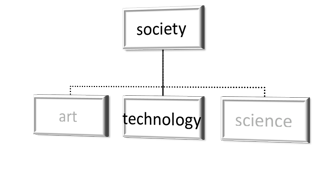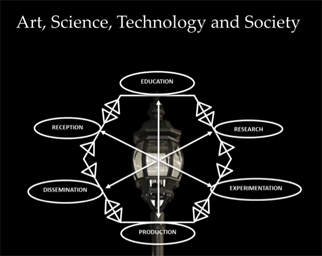 Fig.1: The social reception of the art and science of the last two centuries is clearly dysfunctional. Roc Parés. Fig.1: The social reception of the art and science of the last two centuries is clearly dysfunctional. Roc Parés.

Fig.2: The specialized knowledge model which segregates disciplines should be replaced by a more holistic approach with an equitable distribution of resources which fosters Interdisciplinarity. Roc Parés. |
The cultural relevance of Interdisciplinarity in the context of an unsustainable technified hyper-consumeristic society
We live in a time in which cultural practices are systematically expropriated from society by market economies with the consent of public institutions. Art and Science have been kidnapped and are returned to society in the form of commodities [1] gadgets and military machinery [2]. The new economical agents use creativity and innovation as an added value to win a competitive advantage in their globalized market battlefield. Maintaining the ideals of the free creation as a form of critical action and social emancipation is, more than ever, an utopian resistance effort. In the last decades, across the world, many cultural agents who resist becoming accomplices, have held endless discussions, have written a number of green papers and have completed white papers [3] full of recommendations to policymakers which reclaim the public resources for research as a way to develop human knowledge with the maximum independence towards the market forces.
In general terms, public funding for research has been used for maintaining the status quo, looking for profitable short cycle transfer to industry, with a clear bias that privileges technology and asphyxiates art and other socially and environmentally responsible forms of knowledge production found in between traditional disciplinary organization in the academia. As a consequence, the social reception of art and science of the last two centuries is clearly dysfunctional (fig. 1). Claiming for interdisciplinarity is a political task which implies urgent implementation of the demands which researchers (from all walks of live) have made to policymakers in order to force an equitable redistribution of resources (fig. 2). Failing to do so is not only stopping the plural and diverse development of knowledge but is also expelling some of the most creative, educated and ethically sound cultural agents from the public institutions.
↑ 1. “In a capitalist world, where the aim of everything is to accumulate capital, the role of images in the media, like television or Internet, is to make people consume." (source: Interview with Marc Augé. Text by Ignasi Aragay. Barcelona Metropolis. Autumn (October - December 2009)).
↑2. “The global financial and economic crisis resulted in many nations cutting back on all sorts of public spending, and yet military spending continued to increase. Only in 2012 was a fall in world military expenditure noted — and it was a small fall.” (source: http://www.globalissues.org/article/75/world-military-spending)
↑3. " White Paper on the Interrelation of Art, Science and Technology in Spain", Fundación Española para la Ciencia y la Tecnología, Madrid (FECYT) 2007.
|